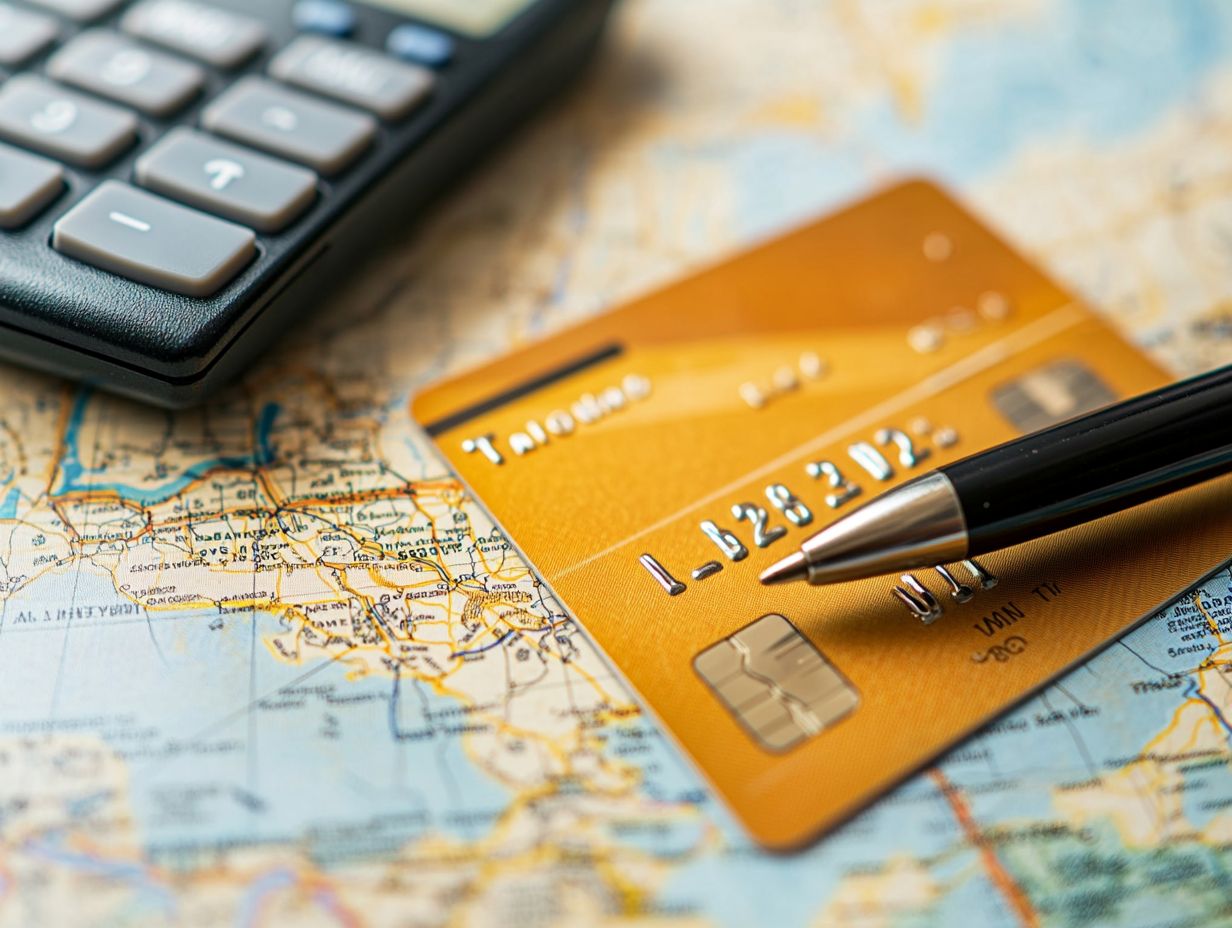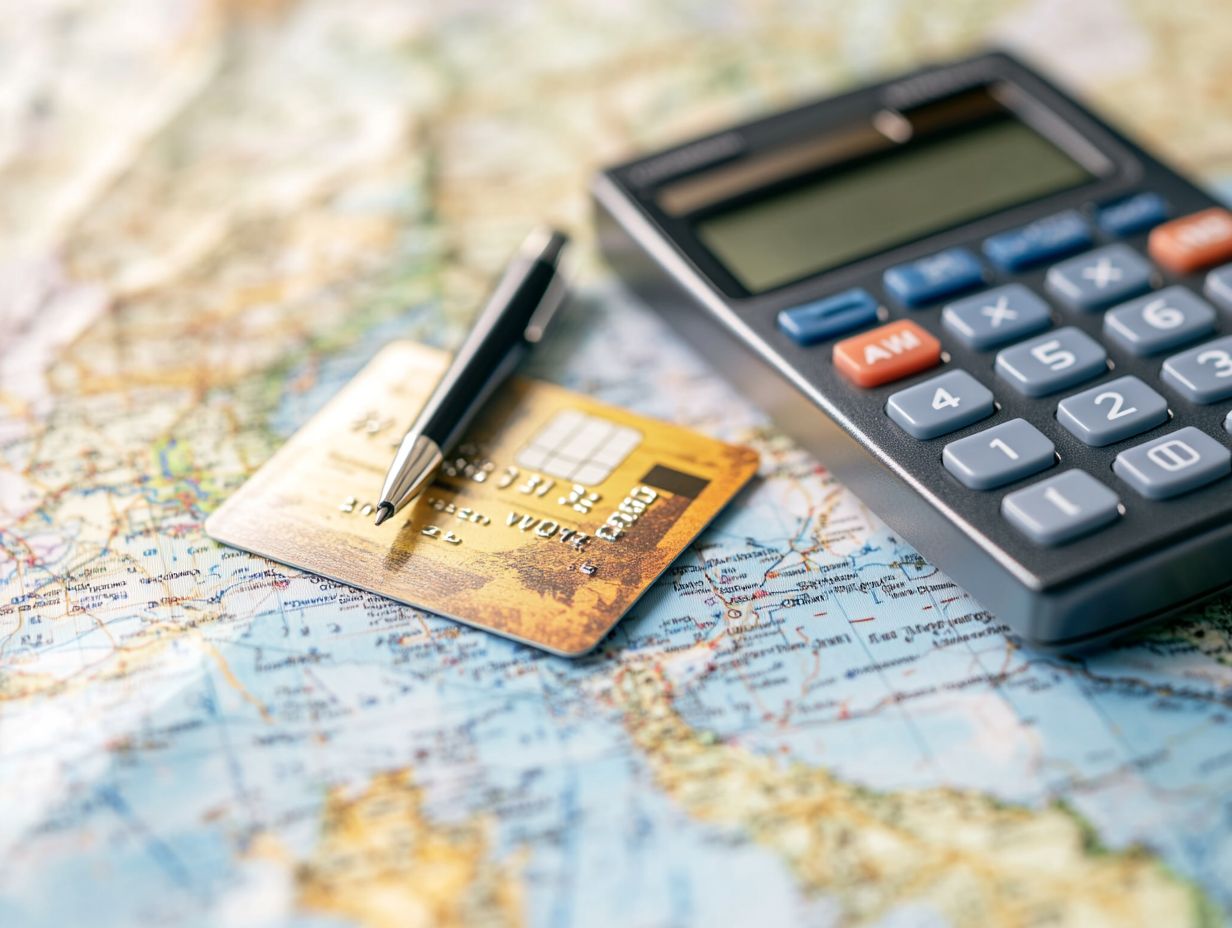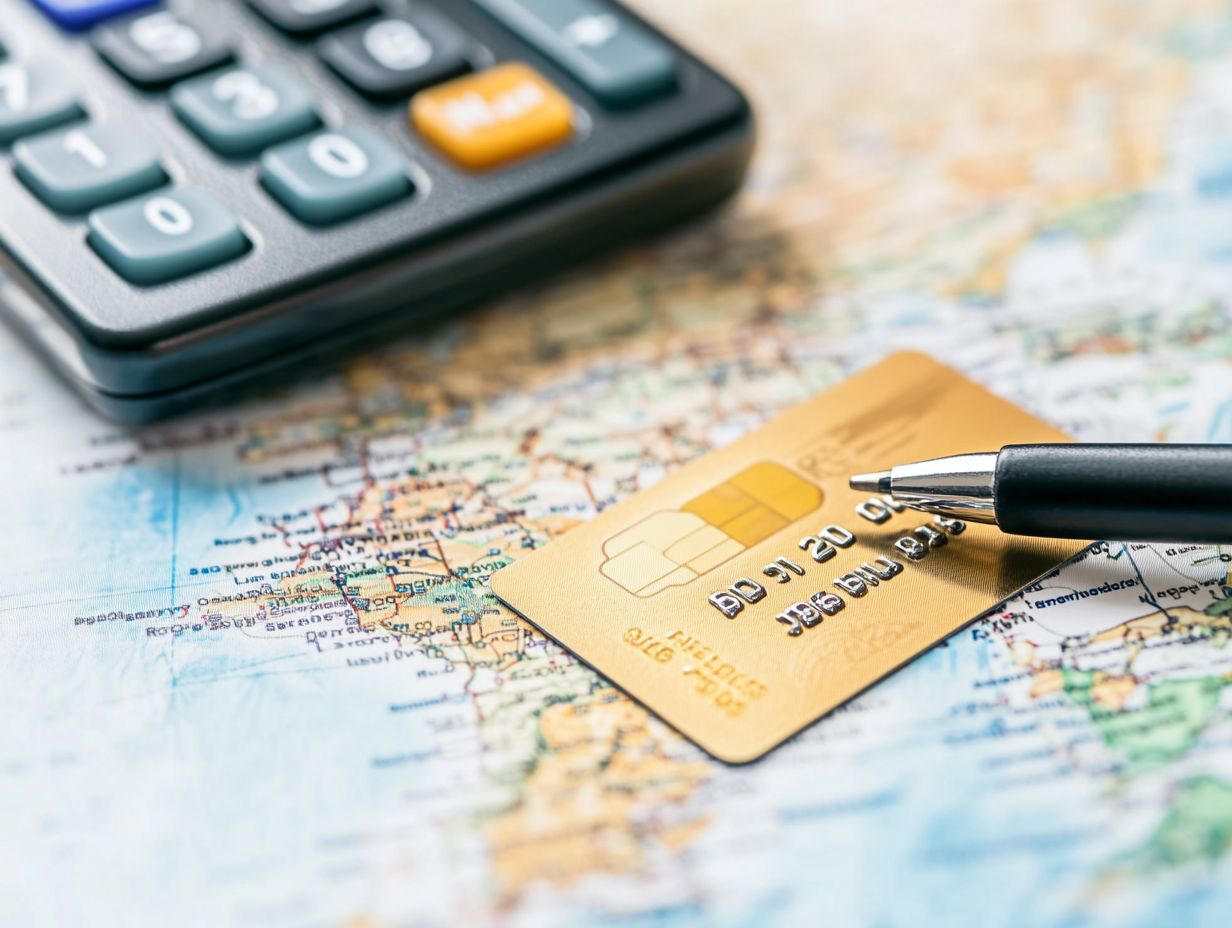5 Hidden Fees to Watch Out for with Travel Credit Cards
Navigating the realm of travel credit cards can be both exhilarating and daunting, especially with hidden fees lurking just beneath the surface. Understanding these costs is essential for maximizing your travel rewards.
This article delves into five common fees that might surprise even the most seasoned travelers. It also discusses strategies to sidestep these expenses, weighs the pros and cons of travel credit cards, and assists you in identifying the best option for your adventures.
Get ready to travel smarter than ever!
Contents
- Key Takeaways:
- 1. Annual Fees
- 2. Foreign Transaction Fees
- 3. Cash Advance Fees
- 4. Balance Transfer Fees
- 5. Avoiding Costly Late Payment Fees
- Are All Travel Credit Cards Subject to These Fees?
- Frequently Asked Questions
- 1. What hidden fees should travelers watch out for with credit cards?
- 2. How can foreign transaction fees impact my travel credit card bill?
- 3. Are annual fees worth it for travel credit cards?
- 4. What are balance transfer fees and how do they impact my credit card bill?
- 5. Is it a good idea to use my travel credit card for cash advances?
- 6. What happens if I make a late payment on my travel credit card?
Key Takeaways:
Here are some key points to remember when choosing a travel credit card:

- Be aware of annual fees when choosing a travel credit card, as they can range from $50 to $1000 depending on the card and its perks.
- Keep an eye out for foreign transaction fees, which are extra charges when using your card abroad. Look for cards with no foreign transaction fees to save money.
- Avoid cash advance fees by using your travel credit card for purchases only, as these fees can be as high as 5% of the transaction amount.
1. Annual Fees
Annual fees are a critical factor to weigh when choosing a travel-friendly credit card. Understanding the reasons to choose a travel credit card can help you assess whether these fees are worth the benefits, as they can significantly influence your overall expenses on trips to destinations like Iceland or the Bahamas. Hidden fees can swiftly accumulate and lead to unexpected costs.
Take, for example, the Chase Sapphire Preferred, which typically charges around $95 annually. This fee can be easily justified by the generous benefits it offers, such as travel insurance and bonus points on purchases.
In contrast, the Capital One Venture Rewards card also has an annual fee, generally set at $95, but it provides a distinct array of rewards that may better align with your travel preferences.
When assessing these fees, it’s crucial to consider how frequently foreign transaction fees come into play. Many cards waive these charges altogether, allowing you to save significantly during your travels.
Striking the right balance between annual fees and the benefits you receive can make all the difference between enjoying a remarkable trip and feeling the weight of unexpected expenses.
2. Foreign Transaction Fees
Foreign transaction fees can silently eat away at your finances when you’re using a travel-friendly credit card abroad. It’s crucial to know which cards provide international service without these pesky extra costs.
These fees, typically ranging from 1% to 3% per transaction, can accumulate rapidly. They can significantly impact your overall travel budget. If you enjoy dining out or booking activities that require multiple card swipes, those surcharges can lead to unexpectedly high expenses.
Some credit cards, like the Chase Sapphire Preferred and the Capital One Venture Rewards, waive foreign transaction fees entirely. This feature can bring you substantial savings, allowing you to channel more of your budget toward enriching experiences instead of hidden banking costs especially when you factor in other travel expenses like hotel amenity fees or vacation rental cleaning charges.
3. Cash Advance Fees
Cash advance fees, often incurred when you withdraw money from an ATM using a travel-friendly credit card, can lead to substantial costs. To avoid this, consider exploring 5 travel credit cards with unique perks that may help you save on fees, especially when combined with high interest charges right from the start.
These fees typically kick in immediately, without the grace period you might enjoy with regular purchases. Unlike standard transactions that often come with rewards or benefits, cash advances impose flat fees and higher interest rates, creating a financial burden that you should carefully consider.
Depending on cash advances while exploring new destinations can quickly deplete your budget, particularly when unplanned expenses pop up. To avoid these pitfalls, consider alternatives such as:
- Using prepaid travel cards
- Opting for local bank networks for ATM withdrawals
- Carrying a combination of cash and a no-foreign-transaction-fee credit card to maintain financial flexibility.
Now that you re armed with this knowledge, start exploring your travel credit card options today!
4. Balance Transfer Fees

Balance transfer fees are often the unsung heroes of credit card plans. However, they can have a significant impact on your finances, especially when you’re consolidating debt or managing unexpected expenses while traveling.
Understanding these fees is crucial, as they typically fall in the range of 3% to 5% of the transferred amount. This adds an extra layer of cost to your financial strategy. For travelers like you, moving a balance from a high-interest card to one with a lower rate could lead to substantial savings on interest, freeing up more funds for your adventures.
Weigh these fees against the savings from lower interest rates. While special offers for balance transfers can be incredibly beneficial, keep a close eye on the timeline for completing transfers. Setting up automatic payments can help you sidestep late fees and preserve your credit standing, further enhancing your travel experience.
5. Avoiding Costly Late Payment Fees
Late payment fees can quickly become a costly oversight for travelers like you who rely on travel-friendly credit cards. If left unaddressed, these fees can snowball into significant interest charges.
These fees inflate your overall credit card balance and can disrupt your future travel plans. As unexpected expenses mount, it’s essential for travelers to manage their accounts effectively, especially during peak travel seasons when costs can easily escalate.
Set up automated reminders today! Don t let missed payments ruin your travel plans. A simple alert on your mobile device or calendar keeps your payments on track. Using budgeting tools helps you stay aware of your financial obligations, giving you the power to enjoy your adventures without the burden of extra fees.
Are All Travel Credit Cards Subject to These Fees?
While many travel credit cards come with a host of fees, such as foreign transaction and balance transfer fees, not all cards impose these charges. Take the time to evaluate your options carefully, including the 5 must-have benefits of travel credit cards. It can make a big difference in your travel costs!
This careful evaluation can significantly impact your travel budget and overall experience. Cards like the Chase Sapphire Preferred or Capital One Venture Rewards often stand out with more favorable terms, such as zero foreign transaction fees and enticing rewards opportunities.
By assessing these attractive features, you can maximize your benefits, earning points on everyday purchases that can ultimately translate into travel perks. Understand the fine print and rewards programs. This knowledge helps you make choices that fit your spending and travel style, leading to smarter financial decisions.
What Are Some Ways to Avoid These Fees?
Avoiding fees linked to travel-friendly credit cards demands a touch of strategic planning. Start by selecting a card with no foreign transaction fees and ensure you set up timely payments to steer clear of late payment charges.
By dedicating some time to research various credit card features, you can uncover options that provide extra perks, such as rewards for travel purchases or cash back on your everyday expenses. Establishing a clear budget is equally essential, as it ensures your spending aligns with your financial goals and helps prevent unnecessary debt accumulation.
Leveraging automated payment services can streamline your payment process, significantly minimizing the risk of late fees. When you manage your card usage thoughtfully, you not only enjoy the freedom of traveling without incurring fees but also maximize your benefits, transforming potential costs into a rewarding experience.
What Are the Benefits of Using a Travel Credit Card?

Imagine slashing your travel costs with the rewards you earn! Using a travel credit card unlocks a world of benefits, allowing you to earn rewards on your purchases. These rewards can help offset costs like hotel amenity fees or cruise expenses while you bask in the sun in destinations such as the Bahamas.
Many of these cards feature enticing rewards programs that let you accumulate points for every dollar you spend. This can lead to free flights, complimentary hotel stays, or even exclusive experiences that make your travels unforgettable. Plus, they often waive foreign transaction fees, making overseas spending feel less daunting and much more budget-friendly.
Many travel credit cards also come equipped with travel insurance, providing you with peace of mind against unexpected hiccups like trip cancellations or lost luggage.
Collectively, these advantages not only elevate your travel experience but also act as a financial cushion, ensuring that each journey is both enjoyable and economical.
What Are the Drawbacks of Using a Travel Credit Card?
While travel credit cards can offer a treasure trove of benefits, such as must-have credit card benefits for travelers, they often come with their own set of drawbacks, including annual fees and hidden costs that might eclipse the rewards you earn on your travel purchases.
For those who prioritize cost-effectiveness, these financial pitfalls can present significant challenges. High annual fees may seem reasonable for the frequent flyer or the jet-setter, but for the occasional traveler or budget-conscious explorer, those expenses could easily overshadow the advantages.
Paying off balances promptly is essential to avoid hefty interest charges, which can further tarnish the allure of racking up points or miles. Don t delay! Weigh these factors carefully to find the right card for you.
How Can One Choose the Best Travel Credit Card for Their Needs?
Choosing the best travel credit card for your needs requires a thoughtful evaluation of various factors, including fees, rewards programs, and your unique travel habits to truly maximize your benefits on each trip.
For example, if you often find yourself on long-haul flights, selecting a card that offers bonus miles or points on airline purchases could be a game-changer for you. Don t overlook the annual fee some cards come with hefty charges that only make sense if their perks align perfectly with your travel patterns.
Consider whether you lean towards cash back, airline miles, or hotel points; this can significantly narrow down your choices. By ensuring that the card s rewards structure aligns with your personal travel goals whether it s saving for that dream vacation or racking up hotel points for free stays you can unlock substantial savings and elevate your travel experiences.
What Are Some Lesser-Known Fees to Watch Out for with Travel Credit Cards?
Travel credit cards often hide a range of lesser-known fees, such as parking charges or returned payment fees, which can catch you off guard if you’re not well-informed. It’s important to be aware of discovering hidden fees in rewards cards.
These additional costs can really rack up the overall expense of using the card, especially when you discover them too late. For example, foreign transaction fees can add up swiftly while you’re shopping abroad, and some cards even hit you with annual fees for withdrawing cash from foreign ATMs.
To effectively navigate these hidden charges, it’s crucial that you thoroughly read the terms and conditions before choosing a card. Additionally, understanding the unique benefits of specific travel credit cards can help you maximize your rewards. Keeping an eye on your account statements regularly will help you spot and address any unexpected fees promptly, ensuring your travel budget stays on track.
Frequently Asked Questions

Some common hidden fees to watch out for with travel credit cards include foreign transaction fees, annual fees, balance transfer fees, cash advance fees, and penalty fees for late payments. To maximize your benefits, be sure to understand 5 things to know about travel credit card rewards.
Ready to start enjoying the benefits of a travel credit card? Apply now and unlock your travel potential!
2. How can foreign transaction fees impact my travel credit card bill?
Foreign transaction fees apply when you make purchases in a foreign currency. They usually range from 1-3% of the total amount. This can add up quickly and increase your credit card bill significantly if you travel often.
3. Are annual fees worth it for travel credit cards?
Annual fees for travel credit cards typically range from $50-$500. While they might seem high, these fees often come with valuable benefits like travel rewards and insurance.
Weigh the annual fee against the potential perks to see if it s worth it for you.
4. What are balance transfer fees and how do they impact my credit card bill?
Balance transfer fees apply when you move a balance from one card to another. Usually, they are a percentage of the transferred amount, ranging from 3-5%.
This can accumulate if you often transfer balances. Always double-check your credit card’s terms before you take action. It can save you money!
5. Is it a good idea to use my travel credit card for cash advances?
Cash advances may seem convenient while traveling. However, they often carry high fees and interest rates.
It’s better to use a debit card or withdraw cash from an ATM with minimal fees instead.
6. What happens if I make a late payment on my travel credit card?
Late payments may lead to penalty fees ranging from $25-$40. Additionally, you may face higher interest rates and a negative impact on your credit score.
Paying on time is crucial to avoid these issues.






